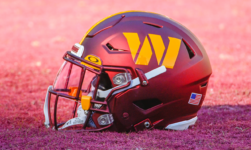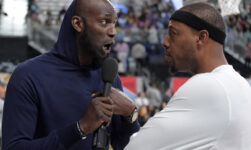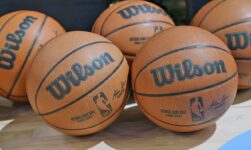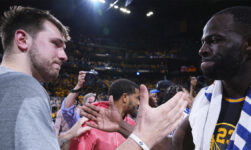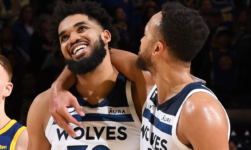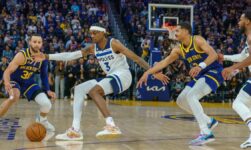Fittingly, two storied franchises will square off in the 75th NBA Finals. Led by Steph Curry, the Golden State Warriors are in pursuit of their fourth title in eight years and seventh title overall. The Celtics, whose run to the Finals was keyed by the play of Jayson Tatum, are hoping to bring home a record 18th Larry O’Brien Trophy.
The ’22 Finals has the makings of an all-time classic. A 53-win team during the regular season, the Warriors made it back to the Finals behind the play of Curry and fellow veterans Klay Thompson and Draymond Green. But unlike previous Finals teams, this Golden State team also includes the talents of 26-year-old Andrew Wiggins and 22-year-old Jordan Poole (ranking all 30 players). Wiggins has been a reliable scorer and rebounder this postseason, while Poole has been an extremely consistent performer all season.
Boston is back in the Finals after successfully running the gauntlet of the Eastern Conference playoffs. After sweeping Kevin Durant’s Nets, Boston took out the defending champion Bucks in seven games before outlasting the top-seeded Heat in another seven-game series. Led by Tatum, veterans Jaylen Brown, Marcus Smart and Al Horford, the battle-tested Celtics are poised to give Curry and the Warriors everything they can handle.
Please check the opt-in box to acknowledge that you would like to subscribe.
Thanks for signing up!
Keep an eye on your inbox.
Sorry!
There was an error processing your subscription.
The Warriors-Celtics series will hopefully end up joining the list of classic NBA Finals series. There has been no shortage of classic Finals series over the decades, as basketball fans have been treated to many memorable games and individual efforts in previous Finals.
With the 75th NBA Finals about to get underway, we decided to look back and rank the top-20 series in NBA Finals history. Before we get to the rankings, here’s a quick look at the criteria used when making the list.
Overall competitiveness Great individual performances Memorable moments Lasting legacy
Without further ado, let’s get started by naming the greatest series in NBA Finals history.
After Bird called out his teammates, Kevin McHale changed the tone of the series when he clotheslined Kurt Rambis in Game 4. Down 2-1 at the time, the Celtics evened the series, then took a 3-2 series lead following Bird’s 34-point, 17-rebound performance in Game 5. The Lakers held serve at home, but they were unable to win on Boston’s fabled parquet in Game 7. Robert Parrish crashed the boards for 16 rebounds, while Bird tallied 20 points and 12 boards in Boston’s 111-102 win.
While the series was a rocky one for Lakers star Magic Johnson, the Laker who committed the series’ biggest error was James Worthy, whose nonchalant pass at the end of Game 2 (which was intercepted by Gerald Henderson) prevented the Lakers from taking a commanding 2-0 series lead.
Cleveland’s 52-year championship drought ended in historic fashion. Down 3-1, the Cavaliers’ rally began with 40-point efforts by both James and Kyrie Irving in Game 5. James keyed another win in Game 6 after putting up a stat line of 41 points, 8 rebounds and 11 assists.
Like two exhausted boxers who had already thrown their best punches, the two teams traded scoreless possessions for several minutes near the end of Game 7 before Irving drained the go-ahead 3-pointer with 53 seconds left. James’ iconic block of Andre Iguodala moments earlier proved to be the defining moment of the series.
The loss prevented the 73-9 Warriors from joining the 1995-96 Bulls in the conversation among the best teams in NBA annals. Golden State fans are probably still not over the NBA’s decision to suspend Draymond Green for Game 5 following his on-court altercation with James.
3. 1969: Celtics 4, Lakers 3
With the dynasty on its last legs, Bill Russell’s Celtics had just enough gas left in the tank to defeat the Lakers in Finals for a seventh time. This one was especially painful for Los Angeles, which had inflated hundreds of balloons prior to tip-off in anticipation of a championship victory.
Trailing 3-2, the Celtics won Game 6 behind Russell’s 19 rebounds. Ahead 103-102 late in Game 7, the Celtics received an all-time break when Don Nelson’s midrange shot dropped through the net after it kicked high off the rim.
Boston took advantage of Wilt Chamberlain’s inconspicuous absence in the game’s final minutes. West, who averaged nearly 38 points per game during the series, became the only player from a losing team to win Finals MVP. It was the 11th and final championship over a 13-year period for the Celtics.
4. 2013: Heat 4, Spurs 3
After an exciting Game 1 (won by the Spurs), both teams traded decisive wins over the next four games. Ahead 3-2 in the series, the Spurs built a 13-point lead late in the third quarter. That’s when things got interesting.
Led by James, the defending champions mounted a furious comeback, as Miami took the lead on a Ray Allen layup with 6:03 left. Five quick points by Tony Parker, however, gave San Antonio a 93-89 lead with under 40 seconds left. San Antonio tightened its grip on the series when Manu Ginobili made a free throw with 28 seconds left.
With the sidelines roped off in anticipation of a Spurs celebration, the Heat kept hope alive after James buried a 3-pointer with 22.9 seconds left. After Kawhi Leonard made one of his two free throughs, the Heat turned to James to tie the game. James missed, but Chris Bosh, after making a critical rebound, found Allen, who tied the score while making one of greatest shots in Finals history. The Heat prevailed in overtime, and took the series in Game 7 behind James’ 37-point performance.
5. 1962: Celtics 4, Lakers 3
Three years after sweeping the Minneapolis Lakers in the Finals, the Celtics faced the Lakers in the Finals for the first time since the franchise moved to Los Angeles in 1960. In an evenly-matched series, the Lakers had a change to win it with seconds remaining in Game 7. But after Frank Selvy’s 12-foot shot did not go through the net for the Lakers, the Celtics pulled ahead in OT and never looked back, winning their fifth title in six seasons.
In defeat, Elgin Baylor put his imprint on the series; he scored 284 points in the series that included his NBA Finals single-game record 61 points in Game 5. Bill Russell also made history by pulling down 189 rebounds for a seven-game series. In Game 7, he also matched his Finals single-game record by recording 40 rebounds in Boston’s 110-107 win.
6. 1970: Knicks 4, Lakers 3
The iconic scene of an injured Reed coming out of the tunnel for Game 7 is the lasting image of a memorable series. Led by Reed, the emotionally charged Knicks recorded a 113-99 win behind Walt Frazier’s 36 points. In a losing effort, the Lakers received a sterling effort by Chamberlain, who averaged 23.3 points and 24.1 rebounds for the series. The Big Dipper struggled at the line, however, as he made just 34.3% of his shots from the charity stripe.
7. 1998: Bulls 4, Jazz 2
Despite their dominance throughout the ’90s, many pundits picked the Jazz, who put up a valiant effort in a six-game series against Chicago in the ’97 Finals, to win the re-match. Those predictions appeared to be prophetic following Utah’s overtime win in Game 1. Chicago, led by Jordan’s 37 points, rallied to win Game 2 while salvaging an early split in Utah.
No one expected the outcome of Game 3. The Bulls’ dominant yet underrated defense allowed a mere 54 points in a 42-point win. Chicago then built 3-1 series lead in Game 4 behind Dennis Rodman’s 14 rebounds. Showing their resolve, the Jazz extended the series with a win in Game 5, as Malone led the way with 39 points.
Game 6 was a classic. In a back-and-fourth duel, the Jazz took a three-point lead on John Stockton’s 3-pointer with 41 seconds left. In what was his final sequence with the Bulls, Jordan responded with a quick layup, then stripped Malone on Utah’s ensuing possession. With the game clock ticking down, Jordan took his time before driving on Byron Russell before stopping and hitting a 17-foot shot with 5.2 seconds left. Chicago then withstood a final, game-winning attempt by Stockton to win its sixth title of the decade.
Jordan scored 45 points in Game 6, while the Bulls received a herculean effort from Scottie Pippen, who played nearly 26 minutes despite a painful back injury. Chicago was +16 with Pippen on the floor in its series-clinching win.
8. 1985: Lakers 4, Celtics 2
Of their 17 championships, this one is arguably the Lakers’ sweetest. After eight Finals losses to Boston (including the ’84 Finals), Los Angeles finally got the better of their longtime rival. In the process, the Lakers became the first visiting team to win a title in the Boston Garden.
Boston picked off where they left off the previous Finals in Game 1, dismantling Los Angeles 148-114 in a game that was dubbed “The Memorial Day Massacre.” It was a particularly rough game for Abdul-Jabbar, whose poor outing led to many media members declaring his demise. The 38-year-old center played with rage in Game 2, scoring 30 points and pulling down 17 boards in a 109-102 win.
With the series nodded at 2-2, Abdul-Jabbar’s 36 points powered Los Angeles to a Game 5 win. Despite McHale’s 32-point, 16-rebound effort in Game 6, the Celtics were unable to keep pace with the Showtime Lakers, as Johnson’s triple-double and Abdul-Jabbar’s 29 points keyed Los Angeles’ series-clinching win.
9. 1988: Lakers 4, Pistons 3
A classic duel between an unstoppable force against an immovable object. While the Lakers still led the West, the Pistons toppled the Celtics as the beasts of the east. The “Bad Boys” strode into Game 1 of the ’88 Finals and walked off the court with a convincing 105-93 win. The Lakers responded with back-to-back wins, the second win coming in front of a packed house inside the Detroit Silverdome.
The Pistons turned up the physicality in Games 4 and 5, and the result was two wins and a 3-2 series lead. Back in L.A. for Game 6, the Pistons received an all-time effort by Isiah Thomas, whose 25 third-quarter points remains an NBA Finals record for one quarter.
Despite Thomas’ brilliance, the Lakers took a 103-102 lead with 14 seconds left. Los Angeles forced Game 7 after Joe Dumars missed a short runner in the game’s final seconds. The Lakers received big nights from Worthy and Johnson, the later living up to his nickname with 22 points and 19 assists.
With Thomas dealing with an ankle injury, the Pistons gave the Lakers all they could handle in Game 7. Trailing 88-73 with 10:38 left, Chuck Daly’s team rallied to make it a two-point game with 1:16 remaining. Detroit was unable to complete the comeback, however, as Thomas missed a jumper that would have tied the score with just over 30 seconds remaining.
“Big Game” James (36 points, 16 rebounds in Game 7) was the right choice for series MVP, but forward A.C. Green deserves mention as he led both teams in rebounding in four of the seven games. It was the fifth and final title for the Showtime Lakers, whose victory over the Pistons made them the first back-to-back champion since the 1968-69 Celtics.
10. 1993: Bulls 4, Suns 2
Years later, Phil Jackson called this “one of the most roller coaster series I’ve ever been in.” Phoenix suffered a case of the nerves in Game 1 and fell at home, 100-92. League MVP Charles Barkley threw the kitchen sink at the Bulls in Game 2, but his efforts were thwarted by Jordan, whose 42 points, 12 rebounds and 9 assists matched Sir Charles’ stat line of 42 points, 13 rebounds and 4 assists.
Down 2-0, the Suns refused to go down quietly. They won a triple-overtime, instant classic in Game 3, then upset Chicago in Game 5 to send the series back to Phoenix. Only Jordan’s 55-point outburst in Game 4 prevented the Suns from winning all three games in the Windy City.
With their fans in a frenzy, the Suns took a four-point lead late in Game 6. But the Bulls countered with Jordan, whose coast-to-coast basket made it a two-point game. With the ball in the game’s final seconds, Jordan passed the ball to Pippen, who passed it to Horace Grant, who then passed to sharp shooter John Paxson, who hit the game-winning shot.
The win put the Bulls in elite company as only the third team in league history to win three consecutive titles. It was an epic Finals performance for Jordan, who averaged 41 points, 8.5 rebounds and 6.3 assists for the series.
11. 1980: Lakers 4, 76ers 2
This series had it all. High scoring, highly competitive games. Numerous stars that included Julius Erving, Kareem Abdul-Jabbar, Daryl Dawkins, Norm Nixon, Maurice Cheeks, Jamaal Wilkes and a 21-year-old rookie named Magic Johnson. The biggest star for most of the series was Abdul-Jabbar, who led both teams in scoring and rebounds in each of the first five games.
But Abdul-Jabbar suffered an ankle injury during the Lakers’ Game 5 win that prevented him from traveling to Philadelphia for Game 6. The Captain’s absence opened the door for an historic performance from Johnson, who started in Abdul-Jabbar’s place at center. Johnson dominated the proceedings, scoring 42 points to go with 15 rebounds and 7 assists. Johnson was complemented on the fast break by Wilkes, whose 37 points and 10 rebounds helped key the Lakers’ 123-107 win.
While he came up short in his second Finals, Dr. J left his mark on the series with his legendary layup in Game 4. Erving would get his coveted NBA championship ring at the Lakers’ expense three years later.
12. 1987: Lakers 4, Celtics 2
In Round 3 of the Lakers-Celtics ’80s rivalry, Los Angeles ran through, over, and around Boston in Games 1 and 2. Larry Bird carried Boston a win in Game 3 and a commanding lead entering the final quarter of Game 4. Johnson, who had ended Bird’s three-year reign as league MVP that season, responded by leading an epic comeback that was capped off by his “junior, junior” skyhook with two seconds left. The Lakers then survived a last-second shot by Bird to take a 3-1 series lead.
The Celtics won Game 5 and had a five-point lead halfway through Game 5. That was when Pat Riley made the switch to defend Kevin McHale with Mychal Thompson, a nine-year veteran who was in search of his first championship. With McHale neutralized by Thompson, the Lakers stormed past the Celtics while cruising to their fourth title of the decade.
Bird averaged a double-double for the series, while Johnson averaged a whopping 26.2 points, 8 rebounds, 13 assists and 2.3 steals en route to his third Finals MVP.
13. 1977: Trail Blazers 4, 76ers 2
An epic Finals between two transcendent stars. Fresh off of winning two titles in the ABA, Julius Erving led the 76ers to the Finals during his first NBA season. Philadelphia was matched up against a Trailblazers team that was fronted by Walton, who won two national titles at UCLA under legendary coach John Wooden.
Philadelphia took a 2-0 series lead that included a convincing 107-89 win in Game 2. Portland responded by unleashing a devastating offense that scored 129 and 130 points in Games 3 and 4, respectively. Games 6 and 7 were epic, with Portland winning both games behind 47 total rebounds by Walton. Walton’s play was just good enough to topple the 76ers and Erving, who scored 37 and 40 points in the series’ final two games.
14. 1957: Celtics 4, Hawks 3
The Celtics had to work to earn their first title. Boston managed to hold off a Hawks team that was led by Bob Pettit, who led both teams in scoring in five of the seven games. In Game 6, Pettit notched 32 points in 23 rebounds in leading the Hawks to a two-point win. Pettit had 39 points in Game 7, but his effort was matched by Bill Russell, who tallied 19 points and 32 rebounds in Boston’s 125-123 win.
15. 1976: Celtics 4, Suns 2
Boston stormed out to two quick wins, but the Suns (who struggled to get their offense going in Boston) rebounded with 105 and 109-point games to even the series. Game 5, regarded as one of the greatest games in NBA history, was a three-overtime thriller that featured one of the craziest sequences in Finals annals.
John Havlicek appeared to give the Celtics a 3-2 series win after banking a shot at the buzzer. But after fans had already started rushing the court, the officials determined that Havlicek’s shot went through with two seconds left on the clock. Once order was somewhat restored, the Suns had one more chance to force overtime. They quickly inbounded the ball to Gar Heard, who launched a prayer that landed through the net, forcing overtime.
The Suns and Celtics would then match wits for two overtime periods before Boston finally got some breathing room in the third OT after reserve Glenn McDonald make it a six-point game. Despite four quick points by Paul Westphal, Phoenix came up on the short end of a 128-126 score. Jo Jo White led Boston with 33 points in Game 6, while Dave Cowens’ 17 board keyed the Celtics’ 87-80 win in Game 7.
16. 1997: Bulls 4, Jazz 2
MVP: Michael Jordan
The Jazz, after rallying to tie the series after dropping the first two games, appeared poised to take a 3-2 series lead heading into Game 5. Not only would the Jazz have their raucous fans behind them, Michael Jordan was severely compromised after dealing with food poisoning. Chicago fell into an early hole but regained its footing behind Jordan, who scored 38 gutsy points that included the go-ahead 3-pointer with 25 seconds left.
Jordan scored 39 points back in Chicago for Game 6, but it was his assist on a midrange shot by Steve Kerr that sealed the Bulls’ fifth title of the decade. Jordan was aided throughout the series by Scottie Pippen, who over the six games averaged 20 points. 8.3 rebounds, 3.5 assists, 1.7 steals and 1.8 blocks. Jordan and Pippen withstood a strong Finals performance from Malone, as the Mailman averaged 23.8 points and 10.3 boards per night.
17. 2010: Lakers 4, Celtics 3
Two years after being outmuscled by Boston, a tougher Lakers team outlasted their rival in what was a physical series. After the Celtics took a 3-2 series lead, the Lakers rebounded with a convincing 89-67 win in Game 6. With Bryant struggling from the field in Game 7, the Celtics went on an 11-2 run to take a 49-36 lead less than four minutes into the second half.
With his shot betraying him, Bryant changed his mindset and started crashing the boards. Bryant’s 15 rebounds helped spur a Lakers comeback that was capped off by Derek Fisher’s game-tying 3-pointer with 6:12 left. Ahead by three points with a minute left, an unexpected 3-pointer by Metta World Peace proved to be the deciding bucket in the Lakers’ 83-79 win.
Bryant won his second consecutive Finals MVP after averaging 28.6 points, 8 rebounds and 3.9 assists for the series. He was aided immensely by Pau Gasol, who for the series averaged 18.6 points, 11.6 rebounds, 3.7 assists and 2.6 blocks.
18. 1994: Rockets 4, Knicks 3
The ’94 Finals featured an epic matchup between Houston’s Olajuwon and New York’s Patrick Ewing. Ewing averaged more rebounds during the series, but Olajuwon averaged nearly 27 points per game (compared to Ewing’s 18.9 points) while also averaging nearly two more assists per game than his future Hall of Fame counterpart.
Down 3-2 in the series, Olajuwon’s 30 points propelled Houston to an 86-84 win in Game 6. The two teams exchanged proverbial punches for most of Game 7 before an Olajuwon bucket and a 3-pointer by Vernon Maxwell made it an eight-point game with 1:48 left. Houston prevailed, 90-84, to capture the franchise’s first of back-to-back titles. New York received a lackluster Game 7 from shooting guard John Starks, who made just two of his 18 field goal attempts.
19. 2005: Spurs 4, Pistons 3
The two teams exchanged blowout wins before playing a thrilling Game 5 from the Palace of Auburn Hills. The difference in the game was 34-year-old Robert Horry, who came off the bench to score 21 points. The former Rocket and Laker scored five points in OT: A vicious dunk and the game-winning 3-pointer that gave the Spurs a 96-95 win.
The defending champion Pistons rallied to win Game 6 but were on the short end of an 81-74 score in Game 7. Duncan clinched his third Finals MVP after tallying 25 points, 11 rebounds, and two blocks in the deciding seventh game.
20. 1951: Royals 4, Knicks 3
The Royals rolled out to a 3-0 series lead, only to watch as the Knicks rallied to win the next three games. In Game 7, the Royals leaned on Arnie Risen, who responded with 24 points and 13 boards to lead them to a 79-73 win. Among the key contributors during the Knicks’ comeback was Harry Gallatin, who averaged a double-double for the series.

